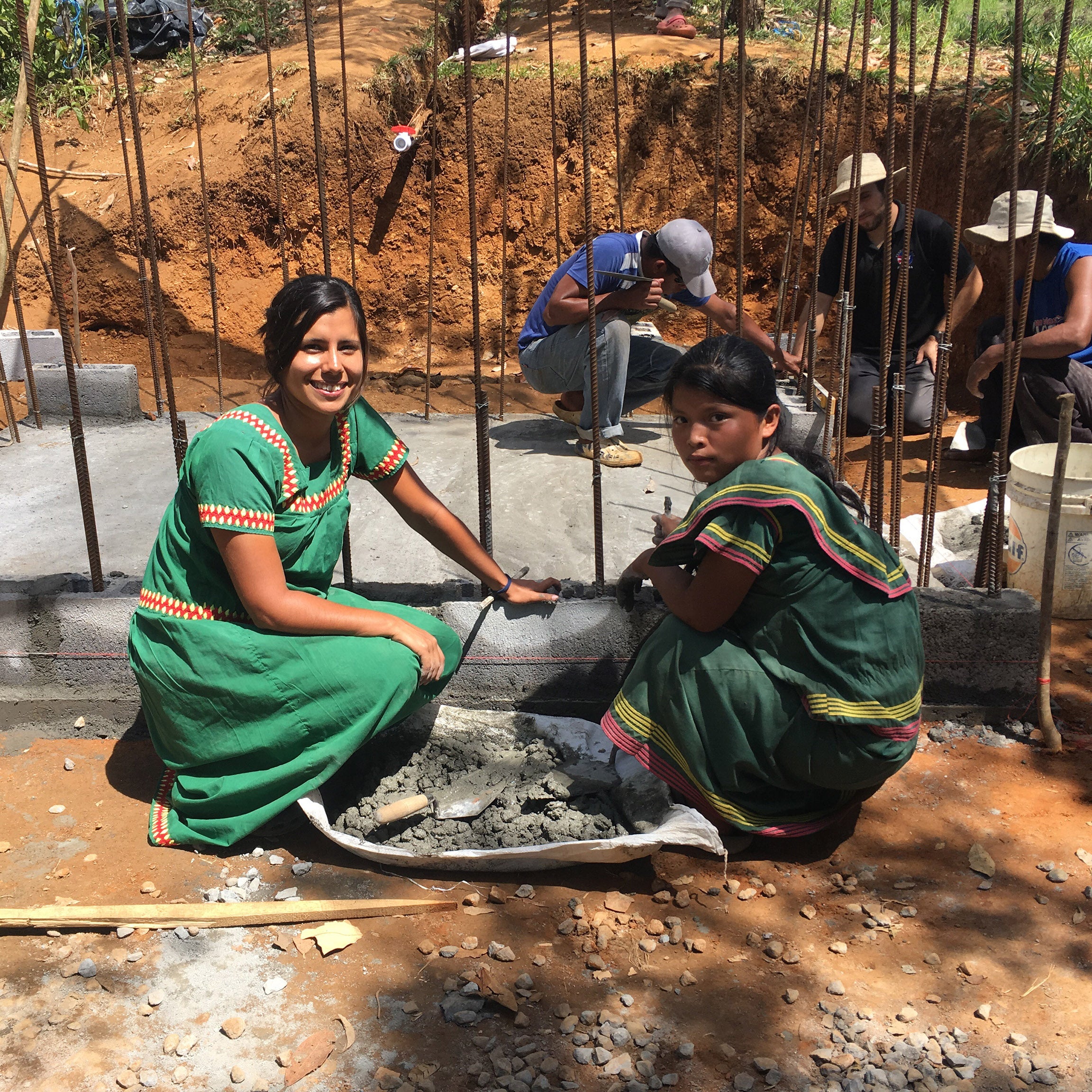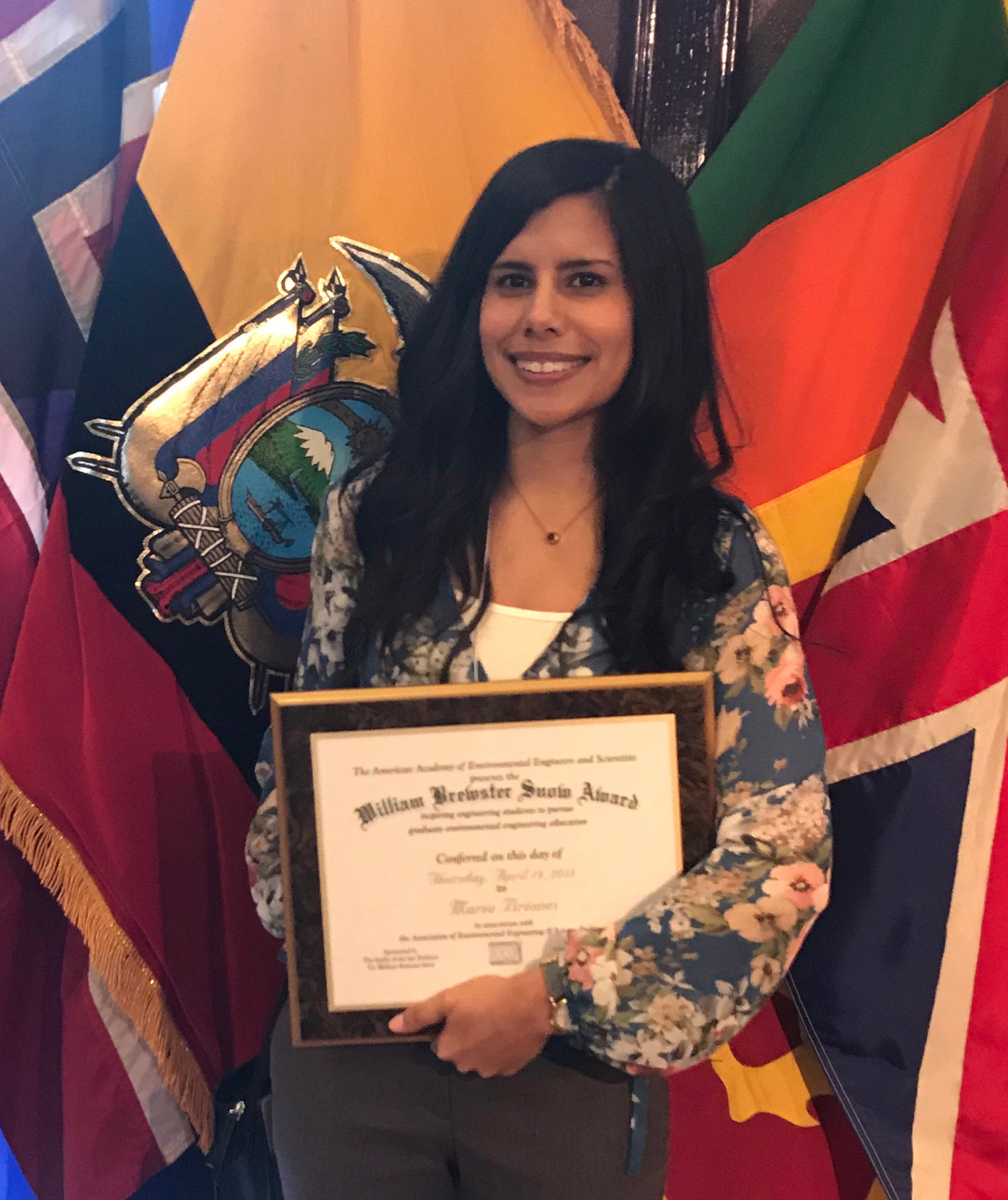KINGSTON, R.I. — May 4, 2018 — University of Rhode Island alumna Maria Briones recently received the W. Brewster Snow Award from the American Academy of Environmental Engineers and Scientists, presented annually to a civil engineering graduate who has demonstrated academic excellence, interest and enthusiasm in the study of environmental engineering.
Briones, who graduated from URI’s International Engineering Program in 2014 with bachelor’s degrees in civil engineering and Spanish, is completing her master’s degree this semester in civil and environmental engineering at the University of South Florida. She received her award at a ceremony at the National Press Club in Washington, D.C. last month.
Her most recent project was the development of a water distribution system that delivered clean water to for a Panamanian village of 100 people. She completed that project as a Peace Corps volunteer and made it the subject of her master’s thesis.
“I was very humbled to receive recognition from professionals that have done and continue to do so much in their field,” Briones said. “I feel like I am still at the start of my career, so it was very exciting to see that people believe in my work and the path I am carving for myself.”

Briones began her engineering education at Cranston High School West, where she participated in the pre-engineering/robotics program. Looking to study engineering in college, Briones thought URI’s International Engineering Program would provide the best experience.
“I chose IEP because I was very interested in traveling, as well as engineering, and engineering programs at many other schools do not make it easy to have an international experience,” Briones stated. “I also did not grow up speaking, reading or writing Spanish, despite my family being from Ecuador and it being their native tongue. I wanted to immerse myself in a situation where my only option was to practice Spanish in order to learn it.”
For her IEP internship, Briones spent a year in northern Spain studying and working at a research facility, Centro de Estudios e Investigaciones, in the field of computational fluid dynamics to model aeration efficiency in wastewater treatment.
“My time in Spain taught me to adapt and be brave in new situations because it will open the door to understanding the way other people live and think, which is a true gift and privilege,” Briones said.
Under the direction of URI Associate Professor Vinka Craver, Briones worked on developing a method to measure nitrous oxide levels in reactivated sludge that is used for the treatment of wastewater.
“Working with Vinka and her graduate students in her lab was a very stimulating experience,” Briones recalled. “It was my first time seeing the mix of intelligence, hard work, innovation and a passion for research that comes from working with such forward thinking individuals and groups.”
Craver gladly took Briones with her to Guatemala, for one of her group’s visits to conduct research and outreach related to clean water.
“As a research undergraduate assistant, Maria traveled with me to the highlands in Guatemala to work on water issues in a Mayan community,” Craver said. “Her level of responsibility and leadership stood out among her peers.”
Her experience in Guatemala inspired Briones to continue her education at USF, where her master’s degree included a concentration in international development engineering. The program integrated graduate coursework and thesis research with two-plus years of training and service in the Peace Corps as a water/sanitation/hygiene (WaSH) engineer in Panama.
For her thesis research, Briones designed a gravity-fed water distribution system for a Panamanian village of 100 people (20 households) using the software program NeatWork. Gravity flow water systems are common methods used to provide improved water to rural residents.
Briones showed villagers how to improve sanitation through the design and construction of latrines. She also trained community members to manage their own water system.
“I’m concerned about people worldwide who do not have access to the basic human need for clean water,” Briones said. “Since this is a field that I have some technical capacity in and a passion for, I should make an effort to see what I can do to understand the issue, and if possible, contribute to a solution.”
According to Briones’ graduate advisor at USF, James Mihelcic, her work in Panama played an important role in the judges selecting her for the W. Brewster Snow Award.
“Maria has qualifications and experiences that are important to the Academy judges, such as academic excellence, a demonstrated commitment to the profession, a detailed understanding of an engineering and research project she led, and exemplary and sustained effort in using her engineering skills to improve the world,” Mihelcic said.
After earning her master’s degree, Briones would like to continue to assist communities that need clean water.
“I will explore how I can contribute to society through water resources engineering, locally or globally,” Briones stated. “I would like to help not-for-profit causes that I believe in that serve marginalized people.”

